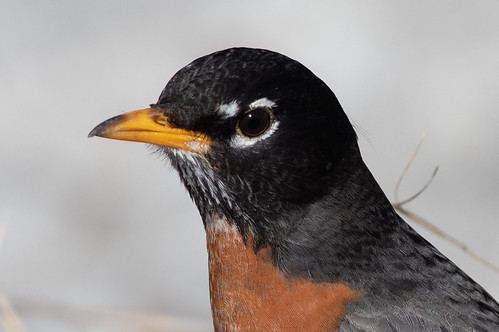Last year, 2020, was a bad year no matter how you look at it. The pandemic started making birders stay close to home starting in late February or March, but I’d had to start that on January 3 when I had a heart attack. By March, I was getting terribly restless and anxious for spring migration to kick in. And fortunately, many birds obliged. My first robin showed up on March 16, singing away, and within a day or two, others were singing here, too.
This year, I saw and heard my first robin on March 17, just a day later than last year, but this time around, I didn't hear a single song. He made some cranky vocalizations at mid-morning, and that was the last I saw of him. I didn’t hear one singing this year at all in March, which was disappointing enough, but my friend Erik Bruhnke’s had one singing in his yard, less than three miles away, for a couple of weeks. And when he told me about it, he didn’t just say it was singing—he said it was caroling, evoking enough loveliness to stir envy.
But finally, on April 2, a couple of robins were calling from tall trees in my yard, and come morning on the 3rd, one was singing away. I set out a couple of my bird baths on Saturday, and a male was soon drinking and bathing away.
Robins have been an essential part of my life for as long as I can remember. I could see them in my grandpa’s yard in Chicago, and when we moved to a little working-class suburb in 1956, they were an everyday presence from spring through fall—running on our lawn, calling from shrubs and trees, and singing from our elms and maple trees. I didn’t necessarily recognize their song the way I did the cardinal’s song, I think because I taught myself to whistle an imitation of the cardinal’s song but the robin’s was just too complex for a child or, indeed, any mere human to do a credible job. Every now and then I run into a person who says he can do a great robin song, but it’s always a pale imitation of the real thing. The larynx in birds is vestigial—just a slight thickening in the trachea without any muscles to produce sound. They have a far more advanced vocal apparatus called a syrinx, located where the trachea bifurcates into the bronchial tubes. Those three branches provide three sites for sets of muscles that can be controlled independently to produce harmonies with the bird’s own voice.
Except for gasps and a very few other sounds, all our human vocalizations—talking, humming, whistling, our own imitations of bird song, etc.—are produced as we exhale. Birds can use and control their syrinx as they breathe both in and out, not needing to pause for breath as they sing.
The robin song sounds like long sentences composed of 2- and 3-syllable words. And it has lovely overtones that we don’t necessarily notice but that enrich the sound. I had never thought about those overtones, and so as my high-frequency hearing diminished, I didn’t realize I was missing them until I got hearing aids in 2015. Suddenly robin songs were SO much more beautiful again—just the way I’d been hearing them as a child and young adult.
One of the mercies of our fading senses as we age is that it’s such a gradual process that we don’t usually notice what we’re missing. But just as my eyes suddenly were seeing vivid colors untinged with dingy browns and yellows after my cataract surgery, so my ears were hearing vivid robin song, with those rich high-frequency overtones, when I got my hearing aids.
The first arriving male robins sing every morning once they settle in on their territory, but the songs won’t be very persistent, going on for hours, until the bulk of male robins are passing through and females are arriving. That is already happening south of here, and will begin here in a week or so.
I like knowing something of the biology and natural history of bird song, but I don’t know of a scientific explanation for what happens in my heart when I hear that first robin song of spring. This is the 70th spring I’ve been on this planet, and somehow that most ordinary, predictable, everyday sound that I’ve heard every one of those 70 springs—a sound you can still hear in big cities, in genuine wilderness, and many habitats in between, still has the power to enthrall.



